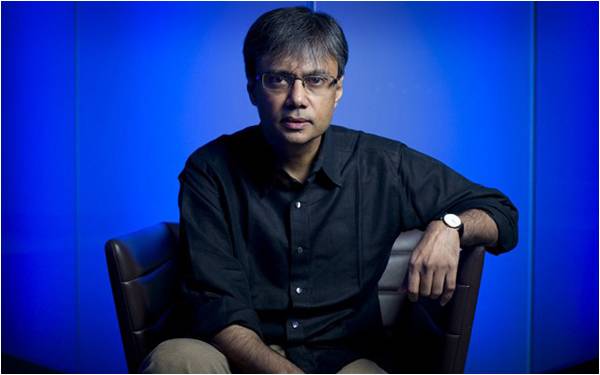
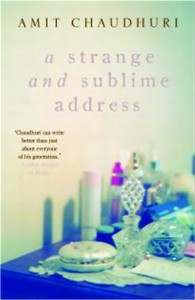
There are writers for whom their job is a pedestal on which to display their own wonderfulness – and then there are those who live according to the ‘fourth wall’. These writers live and breathe in that space between reality and fiction – auteur and audience – so fervently they can make us forget that the fourth wall even exists.
The work of Amit Chaudhuri gives one the feeling that it is located simultaneously in two worlds: in a quiet classroom where questions of perception and the philosophy of meaning are teased out – and out in the street. His work invites stillness and thought in dealing with violent and fluctuating reality. Equally, it gives the urgency of the historical moment to abstract speculation. Chaudhuri’s subtle explorations of visuality – of transparency, solidity, surface, space – extend directly into historical and social metaphors. It is a kind of ‘politicised conceptualism’, where questions and enigmas are posed in the conditions of a particular reality, ‘India’.
Born in Calcutta in 1962, Amit Chaudhuri grew up in Bombay. He attended the University College of London and Balliol College in Oxford. He was Leverhulme Fellow at Cambridge University, and a Visiting Professor at Columbia University and University of East Anglia, Norwich.
He is also the author of five novels, books of short stories, essays, poems, and the polemics. In 2001, he edited ‘The Picador Book of Modern Indian Literature’, and in 2008, his collection of critical essays, ‘Clearing A Space: Reflections on India, Literature and Culture’ was published to critical acclaim. His study of D H Lawrence’s poetry, ‘D H Lawrence and ‘Difference’: Postcoloniality and the Poetry of the Present’ was dubbed as ‘truly groundbreaking’ by Terry Eagleton in the London Review of Books. He has been the recipient of many an award and prize including Betty Trask, Commonwealth Writers’ Award, Encore, Sahitya Academy, and more recently the Infosys Prize.
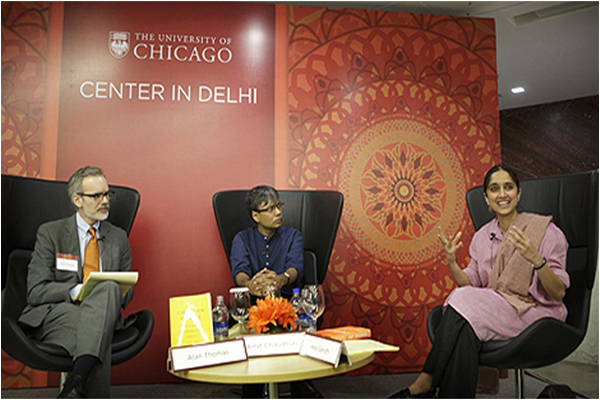
Rather than a linear development, Amit Chaudhuri’s work can be seen in one sense as a continual meditation, modified by changing events, on the relationship of fine art to popular culture or of the intellectual to the mass of people – popular culture being understood not as the mass-consumer culture but as resistance, as the struggle for a voice. Even in his talk at the LLF 2014, his mixture of eloquence and barracuda-like savvy both enthralled and threatened – he can blast holes in our complacency, even when talking into a tape recorder.
[quote]As a child I didn't know any English at all[/quote]
TFT: Books are created in response to a climate of opinion. How did you begin to write?
AC: I became interested in writing as a child. Becoming a poet was one fantasy. (I never thought I would become a novelist or a prose writer – the fantasy had to do with becoming a poet). I had other fantasies too: I wanted to become a chauffeur or a commander-in-chief in the army but those fantasies fell away. I think I began to take pleasure in writing quite early on, and if I may psychoanalyse myself, it had to do probably with the fact that as a child I didn’t know any English at all. My parents, even though both of them knew good English, followed a kind of classic Bengali pattern of not speaking to me in English but only in Bangla. (Unconsciously, my wife and I followed the same pattern with our daughter although we had no intention of doing so. We found ourselves talking in Bengali rather than English. Our daughter picked up English at school from her friends at the age of four, and until then didn’t speak much English).
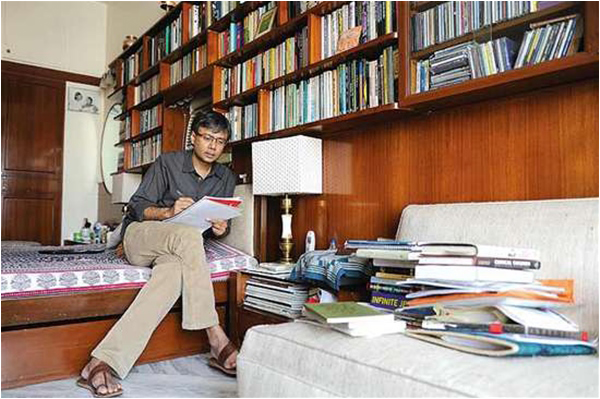
I got admitted to a posh English-medium school called the Cathedral School. The headmistress asked my mother to introduce me to the Ladybird classics and to comic books. I did pick up the language very soon, and then, almost as if to announce the fact that I knew the English language, began to enjoy writing stories in English. When I say ‘stories’, I mean the kind of stories written by a five-year old. I immediately recognised something in it that I liked doing, and was delighted by the fact. The ambition of becoming a poet, however, stayed with me for a long time, and I was primarily interested in poetry, both as a reader and a writer.
As a seventeen-year old poet manqué (until I was about twenty-one), I was writing in the ‘apprentice mode’, that is, writing in the voices of the people who I admired. One day when I was twenty-three, I wrote a poem about an actual place, (I was in London at that point) where my parents had moved after my father’s retirement, called St Cyril Road in Bandra. Before that, I thought I must speak in others’ voices, and must speak about things, which are deemed important by those whom I respected in literature.
I could not find any legitimacy in literature for writing about St Cyril Road. I mean there was no reason to consider it important enough to write about it. But it did open up things for me and I began to write a series of poems about Bandra. The whole experience of the street, of noises coming in, had stayed with me – all that I have become aware of now, of how they operate in India having lived in Britain for a few years where the windows are closed forcing you to dwell in silence. I’d become aware of how much of an impact the streets in Calcutta or Bombay had on me, especially the proximity of noise. After that, I moved to the idea of writing a novel – a boy going from Calcutta to Bombay on holiday with the actual sensation of being alive in the present moment in a Calcutta street. That’s what my first novel, ‘A Strange and Sublime Address’ is about.
[quote]The headmistress asked my mother to introduce me to Ladybird classics and comic books[/quote]
TFT: Was it public admiration or self-adulation that spurred you on to become a poet?
AC: Towards the beginning, my parents’ appreciation was good enough for me; very many people except for family members did not read the poems, so there was no question of public appreciation, as such. St Cyril Road did get published in the London Review of Poems, and two other poems that I wrote, in the London Magazine, but these were just national journals in the UK. That kind of endorsement in itself didn’t mean much to me. I found I wanted to write about the ‘everyday’ within the architecture of a novel, and I didn’t want to do with the novel what had been conventionally done with it – to tell a story, to speak about the characters, etc. The basic impulse was to praise the life around me, and to find a way to register my excitement about it. That is what I began to do in my novels, especially my first novel.
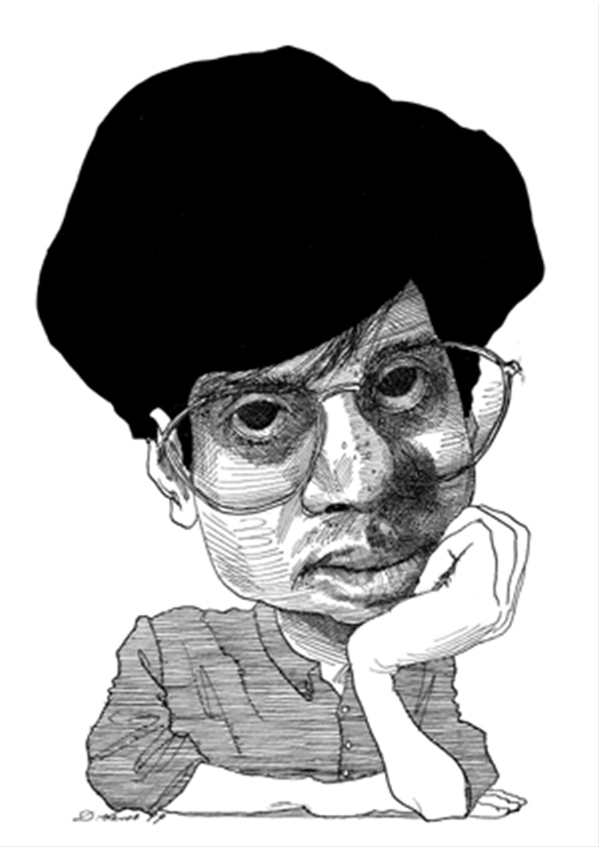
TFT: How did you negotiate with the choice of the adjective ‘sublime’ while referring to a physical space?
AC: There’s an impulse in modernism to hold up the sublime and the epic or the mythic and the sacred, but also to parody it to situate it in the humdrum. The famous example of that is ‘Ulysses’ by James Joyce where Ulysses is the canvas of Leopold Bloom. Joyce also uses the word ‘epiphany’ which is a religious word, to talk about the way he sees the ‘everyday’ in a transfigured way. He parodies the idea of the sacred being something above us, and situates it around us, in the here and now. I used the word ‘sublime’ slightly ironically but also to acknowledge that the sublime is in the here and now.
[quote]I only read the first 120 pages or so of 'Remembrance of Things Past'[/quote]
TFT: You’ve often been compared to Marcel Proust, and Proust is said to be the writer who lived his writing to the extent that he was almost ‘consumed’ by it. How does this comparison sound to you?
AC: People began to compare me to Proust quite early on. I remember three instances from early days to a relatively more recent encounter: one is Khushwant Singh (whom I didn’t know at that time) while talking about my second novel, ‘Afternoon Raga’, saying, “This is like Proust, maybe even better.” And then, Boyd Tonkin, literary agent of The New Statesman, made that comparison. But more recently (and that touched me a lot) was the philosopher, Charles Taylor, coming to me and saying, “Your fiction gives me the kind of pleasure Proust does.” It was immensely flattering to hear these comparisons being made – flattering but also bewildering because there were gaps in my reading, and I hadn’t read a great deal of Proust. (I only read the first 120 pages or so of ‘Remembrance of Things Past’ after having been badgered by people that I reminded them of Proust, and I admit I liked what I read).
I like this point of Proust being consumed by his writing or, indeed, producing his own life as a text. It’s a point that Roland Barthes had made that Proust is not writing about his life; he’s actually producing his life to write about it. This is something I can identify with even more than the writing. On some level, the way I see my life is what I basically do, and that is intimately connected to the output, which is my writing. But I don’t just write about my life. It’s a production of my life that is intimately connected to my writing, so both things are happening: writing is one part of it; creating my life is the other.

TFT: How do novels happen or how does the next novel take shape – from the interior of a work, from experience, from rebellion, from nostalgia or some predilection for the past? In other words, what triggers a novel?
AC: Firstly, I have no time for nostalgia! Nostalgia is a kind of woolly-headed, imprecise idea of the past containing a golden age. (I don’t like golden ages because they are static and immutable, and my sensibility is always on the side of what is animated, changing, and moving, towards what is unfinished rather than finished). When we think of a golden age, we look at it in a finished way. It’s beautifully polished, and I am not drawn to the ‘polished’. On the contrary, I am drawn to certain aspects of life which may have happened either ten years ago or thirty years ago or may be happening now, which contain a sense of being on the move, of being unfinished and animated. So, they always contain a sense of newness because what’s happening now is not finished: it’s only available to you in moments. Even when I was writing ‘A Strange and Sublime Address’, I deliberately chose not to make it a book about my past or childhood; it was always going to be a book about the here and now.
[quote]We are in a world where there are powerful people who are patrons of what gets created, heard or seen[/quote]
Different impulses and different approaches interest you at different times but there is one thing you know: that you cannot repeat a novel. So, there’s always an urge to get away from what you’ve written, to reinvent and approach it differently. In a way, that might also disappoint your readers as they get used to one kind of writing. You fight for the right to disappoint your readers momentarily. It’s undertaken always as an act of faith. From the story ‘Real Time’ and the novel ‘The Immortals’ onwards, I was also interested in what happens to the artist in a free-market world, which has no place for the artist. I became interested in the way power affects art. How does the artist reinvent himself? We are trying to create but we are in a world where there are powerful people who are patrons of what gets created, heard or seen. In my novel, I used the landscape in which a guru from a traditional music family makes his living teaching rich women in Bombay. That’s how I brought in questions like: Is the guru, a guru anymore or an employee?
[quote]'Maleness' is not something I am consciously trying to depend upon or express[/quote]
TFT: In all your five novels to date, I feel it’s the male protagonist who leads the way into the narrative or who, kind of, overrides the situation. Comment.
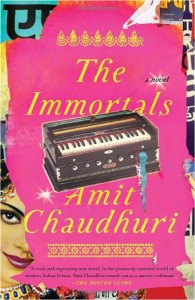 AC: It’s not conscious at all; the coincidence may have to do with the fact that I am male but ‘maleness’ is not something I am consciously trying to depend upon or express. It’s more to do with exploring my sense of being in the world. Often there are coincidental echoes between the narrator and myself but there’s also a lot of distance.
AC: It’s not conscious at all; the coincidence may have to do with the fact that I am male but ‘maleness’ is not something I am consciously trying to depend upon or express. It’s more to do with exploring my sense of being in the world. Often there are coincidental echoes between the narrator and myself but there’s also a lot of distance.In ‘The New World’, my fourth novel, which is also about a male protagonist, there’s no connection with any part of my life – it’s an invented character based on a divorced man who teaches in America. I am not saying this to balance out things! There are also some strong female characters in my novels, like the mother in ‘The Immortals’ who wanted a life as a singer that hasn’t quite come to fruition. But I am not conscious of being weighed either in one direction or the other.
[quote]The proximity of noise had a huge impact on me[/quote]
TFT: Even though you may prefer to eschew the subject, why do I feel compelled to read ‘autobiography’ in your novels?
AC: If autobiography means a story of one’s own life, then that’s not what my novels are about. They are more to do with how one perceives life or, in fact, about how one perceives significance and insignificance. Things overturn, and that’s what I am concerned with. In doing so, one is obviously arguing with other ways of looking and other ways of writing novels and histories which deem certain things important and other things unimportant, although novels may not usually seem to be in argument with other possible ways of writing which are dominant. For instance, the presumption that a novel about India should be dealing with India or with history. In my novels, if I am making space for something different, then I am in argument with these other ways of seeing and thinking.

